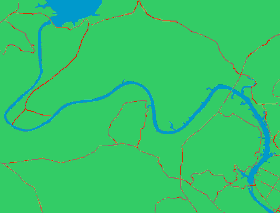Fishing
- Possession and Transport of Exotic Aquatic Species
- Licenses & Regulations
- ShareLunkers
- Fish Identification
- Fish Consumption
- Texas Freshwater Fisheries Center
Water Resources
- Texas Reservoir Levels
- US Army Corps of Engineers
- Texas Water Issues
- Golden Alga
- Aquatic Vegetation
505 Staples Road
San Marcos, Texas 78666
(512) 353-0072
Patrick Ireland, Biologist
Local Information
Nearby State Parks:
Lake Austin
Quick Links: Fishing Regulations | Angling Opportunities | Cover & Structure | Tips & Tactics
BOATER ADVISORY: Zebra mussels have invaded this reservoir! CLEAN, DRAIN AND DRY your boat, trailer, livewells/bait buckets, and other gear before traveling to another water body. Draining water is required by law and possession and transport of zebra mussels is illegal.
Lake Characteristics
Location: On the Colorado River in the City of Austin
Surface area: 1,599 acres
Maximum depth: 75 feet
Impounded: 1939
Water Conditions
Current Lake Level
Conservation Pool Elevation: 491.95 ft. msl
Fluctuation: Constant-level
lake; however, may fluctuate slightly with releases from
Lake Travis upstream
Normal Clarity: Clear to slightly
stained
Reservoir Controlling Authority
Lower Colorado
River Authority
3700 Lake Austin Blvd.
Austin, Texas 78703
(512) 473-3200 or 1(800) 776-5272
Aquatic Vegetation
Watermilfoil and pondweed
Predominant Fish Species
Lake Records
Current
Fishing Report
Stocking History
Latest Survey Report
Lake Maps
No contour map is available for this reservoir. A general information map is available from sporting goods and tackle stores under the name Highland Lakes South. Satellite images of the reservoir are available online at www.terraserver.com.
Fishing Regulations
All species are currently managed with statewide regulations. A Triploid Grass Carp Permit is in effect on this lake. If a grass carp is caught, it must be immediately returned to the water unharmed.
Angling Opportunities
Lake Austin contains an excellent population of largemouth bass bass with the potential for a trophy. Many bass weighing 8-10 pounds are caught each year. The reservoir also has some good quality bluegill, redbreast, and redear fishing, and has low-density populations of flathead and blue catfish. Fishing during the summer months is best done at night due to heavy recreational boating activity in the daytime. Anglers should use caution when fishing at night.
- Largemouth Bass
- Excellent
- Catfish
- Fair
- Sunfish
- Good
Fishing Cover/Structure
Several major creeks enter the lake including Bee Creek near the Tom Miller Dam and Bull Creek near the 360 bridge crossing. Underwater brush piles have been placed in strategic locations to attract and provide cover for fish. Cover is also provided by boulders or rock slides off bluffs and the many boat docks that line the shore of the lake.
Use the Habitat Structure Viewer for an interactive map of fish habitat structures and downloadable GPS coordinates.
Tips & Tactics
Largemouth bass anglers should concentrate their efforts in and along the edges of weed beds that line the shoreline when available. During the summer months (especially on weekends) pleasure boating activity on this reservoir makes fishing from a boat difficult, if not impossible. Anglers should plan trips early in the morning or at night this time of year. Because of the clear water conditions this can be an excellent night fishing lake for bass. Casting white spinnerbaits and topwaters or pitching jigs with heavy bait casting tackle to the weed beds and boat docks often works well. Other popular artificial lures include plastic worms and jerkbaits. For live-bait fishing try minnows suspended under corks along the weedlines. Sight fishing also works well during the spring spawn which occurs February through April, depending on the weather. Because cold water is released from Lake Travis just upstream, bass will spawn later in the year on the upper end of the lake. Look for them in the backs of major creeks, around marinas and in the numerous boat bays that line the lake. Panfishing can also be good along the edge of the weedlines and woody debris using small tube jigs or crickets on light spinning tackle, or small poppers with a fly rod.
